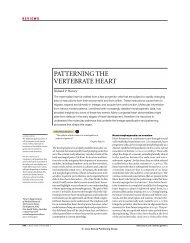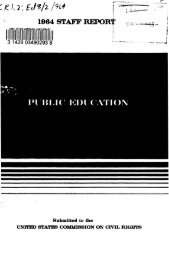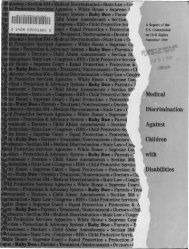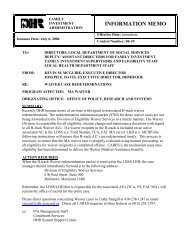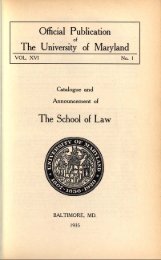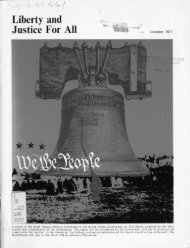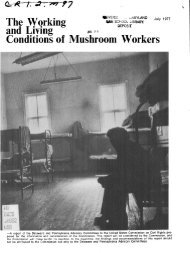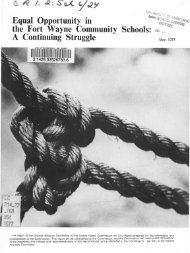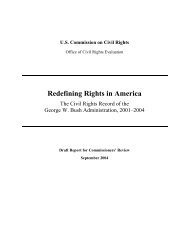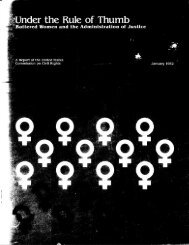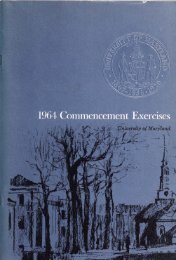1961 US Commission on Civil Rights Report Book 2 - University of ...
1961 US Commission on Civil Rights Report Book 2 - University of ...
1961 US Commission on Civil Rights Report Book 2 - University of ...
You also want an ePaper? Increase the reach of your titles
YUMPU automatically turns print PDFs into web optimized ePapers that Google loves.
Act program, the Southern States received $2,035,904, or approximately<br />
41 percent <strong>of</strong> the total $5 milli<strong>on</strong> appropriati<strong>on</strong>. 62 In fiscal <str<strong>on</strong>g>1961</str<strong>on</strong>g>, out<br />
<strong>of</strong> a total appropriati<strong>on</strong> <strong>of</strong> $7,500,000, they received $3,188,883 or<br />
approximately 43 percent. 68<br />
AVAILABILITY OF SERVICES<br />
In the fall <strong>of</strong> 1960 the <str<strong>on</strong>g>Commissi<strong>on</strong></str<strong>on</strong>g>, through its State advisory committees,<br />
addressed questi<strong>on</strong>naires to 256 LSA participating public<br />
libraries in the 17 Southern States in an effort to ascertain the type and<br />
availability <strong>of</strong> their services to both the white and Negro residents <strong>of</strong><br />
the community served.<br />
The questi<strong>on</strong>naire inquired as to the availability to both races <strong>of</strong> fixed<br />
locati<strong>on</strong> reading facilities; as to whether or not facilities were segregated;<br />
as to hours <strong>of</strong> service and size <strong>of</strong> reference and circulating collecti<strong>on</strong>s<br />
; and as to bookmobile service. 64 In most cases the questi<strong>on</strong>naires<br />
returned were completed by the librarian.<br />
Replies were received from <strong>on</strong>ly 109 libraries located in 11 States. 65<br />
This small return was due in part to the inability <strong>of</strong> some advisory<br />
committees to undertake the task, and in part to the lack <strong>of</strong> cooperati<strong>on</strong><br />
or even open hostility <strong>of</strong> State and local <strong>of</strong>ficials. 56 Replies were received<br />
from 62 libraries in 6 <strong>of</strong> the former C<strong>on</strong>federate States. 67 While the<br />
results <strong>of</strong> the survey are insufficient for a c<strong>on</strong>clusive statistical presentati<strong>on</strong>,<br />
nevertheless the data collected disclosed practices in some <strong>of</strong> these<br />
federally-supported libraries clearly in violati<strong>on</strong> <strong>of</strong> the statute authorizing<br />
Federal aid, and also <strong>of</strong> the c<strong>on</strong>stituti<strong>on</strong>al equal protecti<strong>on</strong> clause.<br />
All 109 replying libraries reported having <strong>on</strong>e or more fixed locati<strong>on</strong>s<br />
<strong>of</strong>fering library service. Of these, 61 gave unqualified service to all<br />
races; 9 reported that the main reference library was for whites <strong>on</strong>ly<br />
but that Negroes and whites were served at branches. Of the 9 reporting<br />
qualified service, 4 had separate racial facilities available at the same<br />
locati<strong>on</strong>; 2 reported "cooperati<strong>on</strong>" between branches and main libraries<br />
in availability <strong>of</strong> special equipment; 2 maintained racially separate rest<br />
rooms; and i reported that while the State allows "service to racial<br />
groups" where books and facilities are provided with public funds, the<br />
county library boards set their own racial policies. The remaining 39<br />
libraries reported having reading facilities <strong>on</strong>ly for whites, or at segregated<br />
branches (some <strong>of</strong> which were merely service stati<strong>on</strong>s for bookmobile<br />
pickup and delivery in homes, banks, stores, etc.). In <strong>on</strong>e<br />
heavily populated county with 12 library branches n<strong>on</strong>e were located in<br />
Negro communities, allegedly because <strong>of</strong> insufficient Negro populati<strong>on</strong>.<br />
599611—fll 11<br />
J 47




